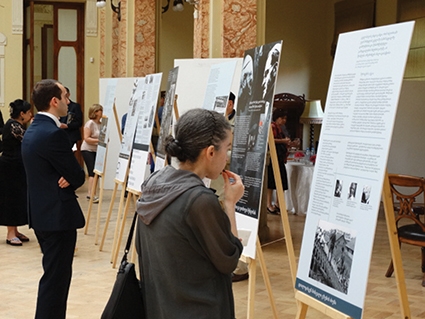The 25th Anniversary of German-Polish Good Neighborhood Cooperation
This year marks the 25th anniversary of the Treaty of Good Neighborhood and Friendly Cooperation between Poland and Germany, which was signed on 17 June 1991. To celebrate, the Georgian National Library on June 20 opened a three-day exhibition organized by the embassies of Poland and Germany in Georgia with the title ‘Poles and Germans. Stories of a Dialogue.’
The exposition depicted Polish-German relations in the 20th century and was officially opened by the Ambassador of Poland, HE Andrzej Cieszkowski; Ambassador of Germany, HE Bettina Cadenbach; and Deputy Foreign Minister of Georgia, Gigi Gigiadze.
“The exhibition shows the development of relations between Germany and Poland from the Second World War onwards,” Her Excellency, Ambassador Extraordinary and Plenipotentiary of Germany Bettina Cadenbach told GEORGIA TODAY. “Relations were bad because Nazi Germany had committed numerous crimes against the Polish people, but in 1991, when we finally signed a treaty on good neighbor relations and cooperation, we turned our relations around and now we have a great exchange at the level of civil society and we have literally millions of Germans and Poles interacting every year, demonstrating that now Germany and Poland are really good partners and are both helping to stabilize Europe.”
Nazi crimes against the Polish Nation are said to have claimed the lives of 2.77 million Christian Poles and 2.7 to 2.9 million Polish Jews, according to estimates of the Polish government-affiliated Institute of National Remembrance. The crimes were committed during the course of the 1939 invasion, as well as the subsequent occupation of Poland. The genocidal policy of the German Third Reich against the Polish nation was the epicenter of Nazi German war crimes (1939–45) and crimes against humanity. Therefore, not all nations would be so forgiving. Poles can without any exaggeration be considered to be one of the most dignified nations, if not top of the list, for choosing to begin reconciliation.
“This is the 25th anniversary of the treaty between Poland and Germany of our good neighborhood relations. We established really full-fledged relations not only between the states but between the societies as well. I think that this is a template to be followed by other peoples and nations in how to overcome a really difficult history and find a way to live peacefully and in a way which is beneficial to both nations,” His Excellency Ambassador Extraordinary and Plenipotentiary of Poland in Georgia, Andrzej Cieszkowski, told GEORGIA TODAY.
Gigi Gigiadze, Deputy Minister of Foreign Affairs, told us, “Germany and Poland, two important European countries, are in Georgia marking one of the most significant events for them both. They have had a lot of serious problems but in spite of all, they managed to sign this significant treaty. I want to underscore those formats in which Germany and Poland cooperate for the benefit of the future of Europe, which serves to strengthen a united Europe, based on united values. This development of relations, between two countries which were not on friendly terms for logical reasons, is a bright example of how big a success the EU can be!”
The turning point for reconciliation came at the initiative of the Polish clergy. Namely, in 1965, the Polish bishops sent a letter to the German bishops in which the necessity of reconciliation was mentioned. The document, supported by Christian aspiration and based on political foresight under the title ‘We pardon and ask to be pardoned’, was attacked by the Polish Communist Party. The Polish side found itself frustrated, as, in the response from German bishops, there was no mention of support in terms of the borders on Odra Nisa. Nevertheless, the letter written by the Polish bishops initiated the reconciliation process between Poland and Germany. It can be presumed then that the interference of the Georgian Church is not superfluous, just the contrary, it can help when all the political forces are unable to reach any results via long negotiations and meetings.
A wide range of political, cultural and social events are scheduled across Europe to celebrate this crucial agreement in the Polish-German history of bilateral relations. The curator of the recent Tbilisi exhibition was the Polish History Museum, which put together the exhibition with the backing of the Ministry of Foreign Affairs of Poland and the Polish Parliament (Sejm).
Maka Lomadze












